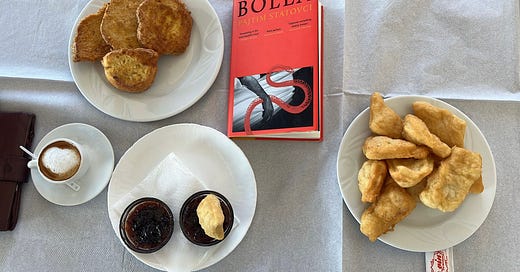Book-bliss #3: “Bolla” by Pajtim Statovci
Ok, I have started “Bolla” from Pajtim Statovci while on vacation. Stealing some alone time from my group of friends, I woke up earlier and read a few pages while nibbling some petulla with one hand, still half asleep. Perhaps that's why the first few pages didn’t convince me much. I found it too cheesy for my taste. I now apologize to this book, because it needed all my respect and attention.
I am always a bit reluctant to read books from Albanian authors because I tend to think I’d write about those emotions better, or that they did not really give the full picture, or that they are conforming to what is the idea of the foreign public of us. But let me tell you straight away, Statovci managed to write a universal book. He tells the story of 24-year-old Arsim, an Albanian who recently got married and dreams of becoming a writer, and medical student Miloš, a Serb. They meet and fall in love in Pristina, the capital of Kosovo, but they are soon torn apart by the Yugoslav wars. Their brief relationship, features the “bolla”, a demonic serpent in Albanian mythology. As folklore has it, the bolla opens its eyes only once a year and then devours every human that sees it. Now Arsim writes a story in which a bolla befriends a blind girl. This story symbolizes hope for the two gay men who are supposed to hate each other due to their ethnicities.
The book is certainly not for you if you are looking for a book with a happy ending. But it is really effective if you are searching for a starting point in understanding how Albanians were discriminated against in Yugoslavia, and how easy it became for people to kill each other after centuries of living together. How quickly and scarily love can transform into murderous hate. It is also a necessary book in the sense that homosexuality has been a strong taboo in this area of the world. It is poetic how well Statovci describes “shame”. How powerful and cancerous it is as a feeling, how sick we turn when we cannot unleash our true self.
I am trying hard to not spoil it all. But the power of Statovci as a writer is such that while I was reading how Arsim elaborates on his life somewhere in Europe as a refugee, I could not stop thinking of all the men of my family who left Albania for Italy in the 90s. I forgot how macho they were, how homophobe they were, how closed off. All I could remember was how, they too, transformed from victims into perpetrators. How lost they were, and how they tried to bring down the new generations who were trying to fly. This book humanized the protagonists so much, that their sexuality is central and peripheral at the same time. And I find it such a beautiful coincidence that “Pajtim”, the name of the writer, means reconciliation in Albanian. The book doesn’t touch upon how Serbs and Albanians will reconcile, it ponders how one reconciles with his own nature. That’s even harder.
For me, this book is a 10/10.




